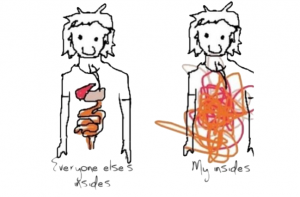
Most IBS sufferers would have heard of the low FODMAP diet. Many would have tried it.
Limiting the consumption of difficult to digest carbohydrates helps many people relieve the symptoms of IBS and allow their intestines to heal. But while the low FODMAP diet was always intended to be a temporary measure to allow the gut to recover, many people understandably avoid the difficult process of reintroducing FODMAP foods into their diet. They should. The most important field in gastrointestinal research these days is the investigation of the microbiota or gut flora. It now seems that the poorly digestible carbohydrates that the low FODMAP diet proscribes are important for maintaining healthy gut flora, which can prevent or relieve an incredible range of illnesses from depression and obesity to arthritis. “Prebiotics” is becoming a buzz word, and it refers to a group of foods that largely overlaps with what is not allowed by a low FODMAP diet: onion, garlic, pulses, beans, dried fruit.
So if you’re someone who has become comfortable with a low FODMAP diet because it has got rid of the trials of having IBS, it’s time to start introducing the foods you’ve been avoiding. This should be done one food at a time, in small quantities at first, to see if it causes a recurrence of IBS symptoms. This may be best done under the supervision of a qualified dietitian.
What has this got to do with Chinese medicine? Only that our overall outlook is that no food is essentially bad. Some foods are inappropriate for some people, some are in appropriate for people with a certain condition. But generally we try to make people healthy enough to eat a wide range of foods without unnecessary long-term restrictive diets.
A typical contemporary research article may be found here: Journal Expert Review of Gastroenterology & Hepatology Volume 8, 2014 – Issue 7